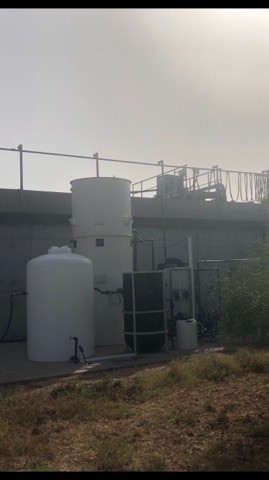Result description
In the framework of MADFORWATER Project, a 10 m3/d pilot plant was installed in the Choutrana municipal wastewater plant, in Tunis. The core of the plant is represented by a two-stage trickling filter, developed to face the increasing demand for efficient pollutant removal and the urgent need to meet treated water reuse standards. Trickling filters are gaining popularity due to their simplicity, low energy requirements and low operating costs, thanks to the elimination of aeration costs. The first stage is designed to achieve BOD oxidation, the second is aimed at nitrification. The effluent is then sent to a tertiary treatment consisting in a constructed wetland. The treated wastewater is used to irrigate corn and wheat in a nearby pilot plant in which innovative irrigation technologies developed by the MADFORWATER project are being tested.
The effectiveness of the biological treatment of the pilot’s main wastewater streams was examined. The microorganisms developed in the trickling filter were able to efficiently remove pollutant levels under aerobic conditions at pH values between 6.9 and 7.8. The percentages of removal in the whole treatment varied between 57% and 90% for COD, 58% and 92% for BOD and 66% and 93% for suspended solids (TSS). All the values of COD, BOD, TSS and conductivity in the secondary treated wastewater were in coherence with the regulations fixed by the Tunisian standard for National Sanitation Office Public Pipeline (NT.106.02) as well as the new regulations published in 2018 (Official Journal of the Tunisian Republic) regarding the discharge within the Public sanitation network. Regarding those parameters, physico-chemical characterization of the effluent exhibited also a conformity with the Tunisian Standards for irrigation with treated wastewater (NT.106.03). The proposed biological treatment process based on a trickling filter, appears as a promising, low-cost, low-energy process for municipal wastewater treatment.
Addressing target audiences and expressing needs
- Help in technical expertise
- Collaboration
- Other type of Investment
The developed innovative trickling filter seems to be a promising alternative for conventional biological treatment. The technology is intended to treat sewage arising from small villages with about 5000 inhabitants. We are looking forward to satisfying the stakeholders demand in term of new affordable and efficient treatment for MWW. We aim to sensitize the key decision makers and government bodies to discuss and harness the potential of this technology. We also need to approach investors, WWTPs managers and farmers to offer them a new alternative that may fit with their specific needs.
- EU and Member State Policy-makers
- International Organisations (ex. OECD, FAO, UN, etc.)
- Research and Technology Organisations
- Private Investors
R&D, Technology and Innovation aspects
Result submitted to Horizon Results Platform by ALMA MATER STUDIORUM – UNIVERSITA DI BOLOGNA

